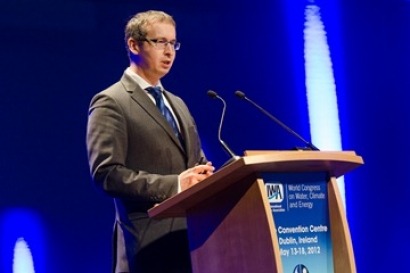
"Population growth has put pressure on water supplies in many regions of the world. The energy community is taking the water challenge very seriously, and we recognise that there is also a need for stronger co-operation between governments and the energy and water sectors," said Einari Kisel, the World Energy Council's (WEC) Senior Fellow for European Policies and Partnership Development, at the recent World Congress on Water, Climate and Energy.
The event was held in Dublin, Ireland.
During a keynote speech, Kisel spoke about the WEC's programmes, studies, and dialogue events, and highlighted the WEC's efforts in facilitating collaboration between the water and energy sectors through its recently announced partnership with the World Water Council.
In his remarks Kisel drew heavily from the WEC's report Water for Energy. The report finds that while today's water supply is sufficient for the water needs for energy production and conversion, other uses - especially agriculture -- are putting ever greater pressure on the water system.
Unconventional sources of energy (e.g. oil sands, oil shale, and deep gas shale) also require large amounts of water, further stressing current and projected systems, the report said.
It concludes that many existing and new technologies look promising for making water more available and its use more efficient. Therefore policymakers must try to accelerate their entry and their benefits into common use.
Kisel said the report is valuable because it has "identified the magnitude of the issue for different regions in the coming decades."
In other World Energy Council news, the organization's latest policy assessment suggests the UK risks missing its 2030 targets for greenhouse-gas reductions because of a lack of incentive to invest in carbon capture and storage technologies.
The U.K.’s emissions performance standard of 450 grams of carbon dioxide per kilowatt-hour is inadequate to give a clear signal to the industry to invest in projects that trap the greenhouse gas and pipe it underground for permanent storage, Joan MacNaughton, executive chairwoman of the energy council, said in an interview with Bloomberg.
A level of 150 grams would be appropriate, she said.
Photo credit: Noel Hillis/IWA
For additional information:

